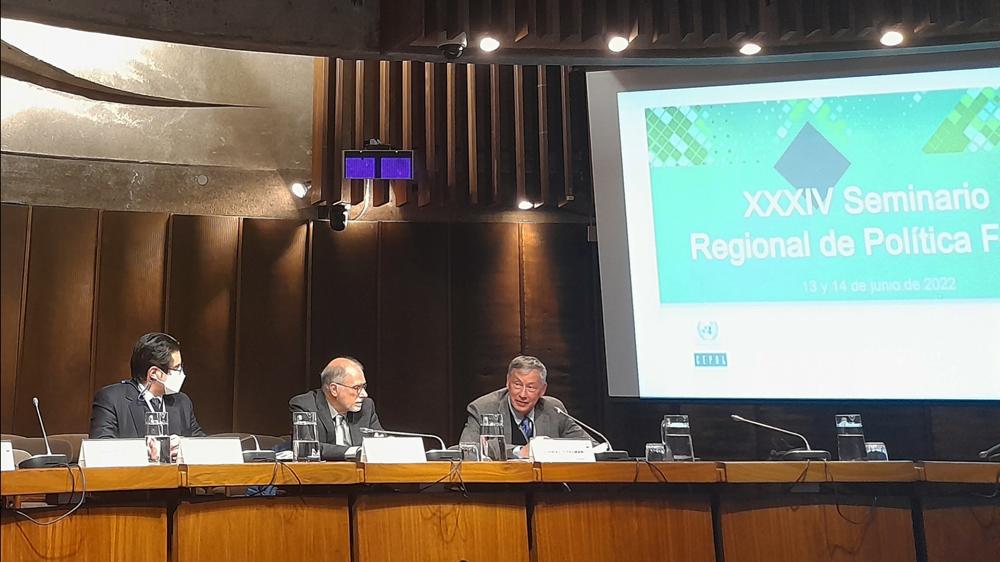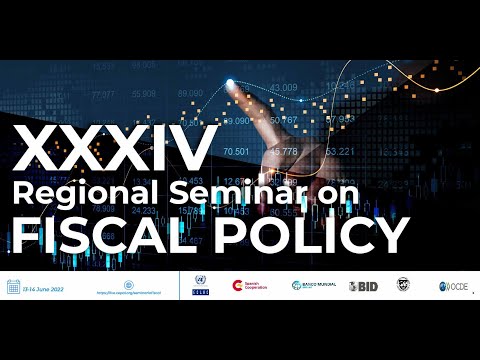Participants in XXXIV Regional Seminar on Fiscal Policy Stress the Importance of Strengthening Tax Revenues and Public Spending as Instruments for Development
Work area(s)
The gathering, which brought together Finance authorities from 12 Latin American and Caribbean countries as well as prominent international experts, concluded on Tuesday, June 14 at ECLAC’s headquarters.

Leading officials and other authorities from the Finance Ministries of 12 Latin American and Caribbean countries, along with prominent international experts, concluded today the XXXIV Regional Seminar on Fiscal Policy, where they addressed the fiscal policy challenges for a sustainable and inclusive recovery.
The event – organized by the Economic Commission for Latin America and the Caribbean (ECLAC), with support from the Inter-American Development Bank (IDB), the Organisation for Economic Co-operation and Development (OECD), the World Bank and the International Monetary Fund (IMF), and sponsored by the Spanish Agency for International Development Cooperation (AECID) – brought together, in person and virtually, nearly 50 presenters, including government authorities and respected experts from international organizations, academia, civil society and non-governmental organizations.
In seven sessions addressing important topics such as tax revenue statistics in the region’s countries, the perspective of international organizations, fiscal rules and fiscal relations between levels of government – among others – the participants stressed the importance of strengthening tax revenue collection, the progressivity of countries’ tax structures and public spending as instruments for development.
In the closing session, Spain’s Ambassador to Chile, Rafael Garranzo García, thanked all the institutions that had made the seminar possible and reaffirmed the commitment of Spanish cooperation to continue collaborating on holding it.
“The overall objectives are clear: to improve the efficacy and efficiency of revenue-raising policies so as to promote the mobilization of domestic resources with equity, ensure the efficiency of public spending, reiterate the public sector’s responsibility for laying the foundation for greater fiscal capacity and generating citizen trust towards institutions, and also creating the conditions for greater social cohesion in order to reduce inequalities,” he indicated.
“To this end, it is necessary to think about tax reforms that would increase revenue without affecting investment, consumption and the level of economic growth, about the incorporation of new tax rules, such as progressive taxation on high income (or wealth taxes), as well as the implementation of structural reforms, environmental taxes, taxes on specific goods that would alleviate the public health burden, and the fight against tax evasion and avoidance, among other measures,” Ambassador Garranzo added.
Meanwhile, the Director of ECLAC’s Economic Development Division, Daniel Titelman, emphasized that the significant challenges arising in a post-pandemic environment marked by climate crisis entail a major fiscal policy effort. “As has been emphatically stated at this seminar, fiscal policy will have to play a central role, particularly in Latin America and the Caribbean, to be able to invigorate growth and move towards a path of sustainable and inclusive development,” he asserted.
During the XXXIV Seminar on Fiscal Policy, speakers presented the conclusions of three recent publications: Revenue Statistics in Latin America and the Caribbean (2022 version), a document prepared jointly by ECLAC, the OECD Centre for Tax Policy and Administration, the OECD Development Centre, the Inter-American Center of Tax Administrations (CIAT) and the IDB; the Fiscal Panorama of Latin America and the Caribbean 2022, an annual report by ECLAC; and the Overview of Fiscal Relations between Levels of Government in Latin American and Caribbean Countries 2022, a study carried out jointly by ECLAC and the IDB.
Related content

XXXIV Regional Seminar on Fiscal Policy
The XXXIV Regional Seminar on Fiscal Policy is organized by the Executive Secretary of the Economic Commission for Latin America and the Caribbean (ECLAC), through the Economic Development Division…

Public Revenue Must Be Strengthened to Expand Fiscal Space and Give Sustainability to Spending
Authorities from Finance Ministries in 12 of the region’s countries kicked off the XXXIV edition of the Regional Seminar on Fiscal Policy, at ECLAC’s headquarters.

XXXIV Regional Seminar on Fiscal Policy (Tuesday, 14 June)
Recording of the second day of the XXXIV Regional Seminar on Fiscal Policy (Tuesday, 14 June, 2022), English translation. Includes: Session 4 – Strengthening tax revenues and…
Type
Country(ies)
- Latin America and the Caribbean